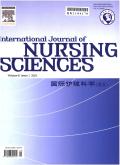Psychological effects of virtual reality intervention on breast cancer patients with different personalities: A randomized controlled trial
IF 3.1
3区 医学
Q1 NURSING
引用次数: 0
Abstract
Objectives
To explore the efficacy and safety of virtual reality (VR) in relieving negative emotions in patients with breast cancer with different personalities.
Methods
A randomized controlled trial was conducted. Between April 2023 and October 2023, we enrolled patients with breast cancer treated in the Department of Breast Cancer and Oncology at Sun Yat-Sen Memorial Hospital, Sun Yat-Sen University, Guangdong Province. The patients were randomly divided into an intervention group (n = 118) and a control group (n = 119) using block randomization. The intervention group received the VR intervention 3 – 5 times over 5 ± 2 weeks using natural landscapes with music or relaxation guidance, and the duration of each VR intervention was 15 ± 3 min. The control group received routine nursing care, including disease education and psychological counseling. Patients were assessed using the Type D Scale, Positive and Negative Affect Scale, and Distress Thermometer, and adverse events during the intervention were recorded.
Results
Overall, 85 patients completed the study (44 in the intervention group and 41 in the control group). Patients with Type D personalities showed more negative emotions [25.0 (21.5, 27.5) vs. 19.0 (16.0, 24.0), P = 0.001] and distressed attitudes [4.0 (2.0, 5.0) vs. 3.0 (1.0, 4.0), P = 0.020] with fewer positive emotions (27.2 ± 5.6 vs. 31.0 ± 5.9, P = 0.014) than those with non-Type D personalities. Total population analysis revealed no significant differences between the groups. However, in the subgroup analysis, patients with Type D personalities in the intervention group showed greater relief from negative emotions than those in the control group [median difference, −5.0 (−9.0, −2.5) vs. −2.0 (−4.0, 2.0), P = 0.046]. No significant differences were found between groups of patients with non-Type D personality traits. The proportion of adverse events was not significantly different between groups (P = 0.110).
Conclusions
Breast cancer patients with Type D personalities suffer more severe negative emotions and distress, and more attention should be paid to them. VR intervention significantly and safely reduced negative emotions in patients with Type D personalities.
虚拟现实干预对不同性格乳腺癌患者的心理影响:一项随机对照试验
目的探讨虚拟现实(VR)技术缓解不同性格乳腺癌患者负性情绪的有效性和安全性。方法采用随机对照试验。在2023年4月至2023年10月期间,我们招募了在广东省中山大学孙逸仙纪念医院乳腺癌肿瘤科接受治疗的乳腺癌患者。采用分组随机法将患者随机分为干预组(118例)和对照组(119例)。干预组采用自然景观、音乐或放松引导进行VR干预3 ~ 5次,每次干预时间15±3 min,共5±2周。对照组接受常规护理,包括疾病教育、心理疏导等。采用D型量表、积极和消极情绪量表、焦虑温度计对患者进行评估,并记录干预期间的不良事件。结果85例患者完成研究(干预组44例,对照组41例)。D型人格患者负性情绪较多[25.0(21.5,27.5)比19.0 (16.0,24.0),P = 0.001],苦恼态度较多[4.0(2.0,5.0)比3.0 (1.0,4.0),P = 0.020],积极情绪较少(27.2±5.6比31.0±5.9,P = 0.014)。总体分析显示各组之间没有显著差异。然而,在亚组分析中,干预组的D型人格患者比对照组的负性情绪得到了更大的缓解[中位差为- 5.0(- 9.0,- 2.5)比- 2.0 (- 4.0,2.0),P = 0.046]。非D型人格特征患者组间无显著差异。不良事件发生率组间比较差异无统计学意义(P = 0.110)。结论D型人格的乳腺癌患者负性情绪和痛苦更为严重,应引起重视。VR干预显著且安全地降低了D型人格患者的负性情绪。
本文章由计算机程序翻译,如有差异,请以英文原文为准。
求助全文
约1分钟内获得全文
求助全文
来源期刊

International Journal of Nursing Sciences
Nursing-Nursing (all)
CiteScore
6.10
自引率
2.60%
发文量
408
审稿时长
25 days
期刊介绍:
This journal aims to promote excellence in nursing and health care through the dissemination of the latest, evidence-based, peer-reviewed clinical information and original research, providing an international platform for exchanging knowledge, research findings and nursing practice experience. This journal covers a wide range of nursing topics such as advanced nursing practice, bio-psychosocial issues related to health, cultural perspectives, lifestyle change as a component of health promotion, chronic disease, including end-of-life care, family care giving. IJNSS publishes four issues per year in Jan/Apr/Jul/Oct. IJNSS intended readership includes practicing nurses in all spheres and at all levels who are committed to advancing practice and professional development on the basis of new knowledge and evidence; managers and senior members of the nursing; nurse educators and nursing students etc. IJNSS seeks to enrich insight into clinical need and the implications for nursing intervention and models of service delivery. Contributions are welcomed from other health professions on issues that have a direct impact on nursing practice.
 求助内容:
求助内容: 应助结果提醒方式:
应助结果提醒方式:


